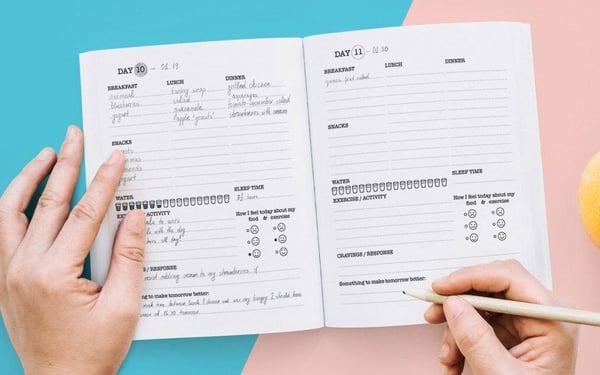- Do you like to keep a note of things?
- Is maintaining a diary or journaling your hobby?
- Ever wondered about the positive and negatives of journaling?
On a global scale about a billion people like to maintain a journal or diary of sorts. What’s more interesting is that there are approximately 6.5 billion people that don’t. Considering these numbers, it can be said that not many people prefer to keep a journal.
Even the perceived benefits of keeping records of your daily life don’t seem to outweigh the burden of having to maintain it. Not to mention how immensely beneficial journaling can be for both your mental and physical health.
Let’s find out!
Benefits Of Journaling For Physical Health
The following are the benefits of journaling for keeping records of your physical health.
1. Helps in keeping track of what you eat
Firstly, journaling allows you to keep track of what you eat in a day. Counting your calories is one thing but writing down what you had throughout the day by the end of it allows you to reflect where you lack the will and can do better.
2. An inspirational record of events for your future self
We all have our ups and downs. And sometimes it can be challenging to keep up with fitness when you lack motivation. Journaling can be an inspirational record of current events for your future self when you look back at the time of downfall. You can see what you were doing different or better that helps you stay motivated, and that can inspire you to get back on track.
3. Great for identifying patterns and ailments
Now that you note down what you eat, you can identify patterns and ailments. You can see for yourself how you felt after having a salad as compared to having a hamburger. Such patterns can help you check yourself for any digestive or other physical issues because you would know for a fact what you ate for it to happen.
4. Allows you to schedule your routine activities
Journaling, by default, is scheduling. You can easily make routine activity plans by journaling eating and workout regimes. You can see for how long you sustain a diet when you are allowed to have a cheat meal and days when you can skip the gym.
5. Easier to keep a check on your triggers
Let’s say you have an allergy you weren’t aware of before. Journaling your physical activity and eating habits makes it easier to keep a check on your triggers. You can know for sure that what you ingest or do that triggers such a reaction, for instance, dairy products and fast food often cause skin breakouts etc.
Cons of Noting Down Your Physical Health
Just like two sides of the same coin, there are some negative points pertaining to journaling for physical health, especially if you don’t tend to draw the line.
1. Leads to harboring body negativity
Just like journaling encourages you to do better and enhances body positivity, on the flip side, it can lead you to harbour body negativity too. You can get too absorbed in maintaining your physique a certain way that after a while it becomes just what you do and eat to maintain the journal and lack on actual nutritional diet and lifestyle that is supposed to benefit you. Many people even lack the confidence to showcase their strengths and end up seeking personal statement help.
2. You don’t notice the difference of what to note and what to omit
After a while, journaling can become an obsession. And when you are no longer capable of differentiating between real life and notes that you make in your diary, you tend to input anything and everything, and that can become toxic very quickly.
You should understand that it is your journal, and therefore it should only stay limited to you. Extending the initiative towards your partner or friends can become annoying, especially if they are not willing to take part.
3. You become a passive observer of your life
Instead of living your life fully, you become a passive observer of your life like a third person having a perception. This happens when you start looking at things to eat and situations for your journaling mindset. All your focus about in your life is journaling contexts rather than living them.
However, some people lack critical analysis skills and hire best assignment writing service UK for their university projects and office tasks that require reflective writing.
4. You become too conscious of everything you do
Journaling makes you too conscious of everything you do because you start focusing on the consequences of going back and reading about a failed day. Take your failures as a part of your journey. It doesn’t mean that if one day you had a cheat meal or skipped gym then attributing it in your journal would make it any less appealing.
5. Can lead to a worsened mental health
We seldom realize that our mental and physical health is connected somehow. A fit person is one who has successfully controlled both and not one. Because if the diet is not making you happy then no matter what good it does to your body physically, mentally you will be distraught. The key to consistency is journaling with a positive mindset, so it doesn’t lead to worsened mental health than before.
Bottom Line
In conclusion, hopefully, the pros discussed above have convinced you to maintain a journal for the positives of your physical health and dodge the cons. After all, journaling for physical health is not that bad of a decision if you know your limits.
However, the actual challenge is in sticking to maintain one. Therefore, in a crowded room, you will easily find people who actually keep a journal but largely those who would have tried to keep one but failed.
Let’s try to maintain one after this, shall we? Good Luck!

Author bio: Samantha Kaylee is currently working as a freelance writer at a platform known to offer essay writers service. She has been a body positivity advocate for a significant amount of time. She likes to write and share her expertise and opinions through her blogs.
NOW ON SALE!






Leave Comment